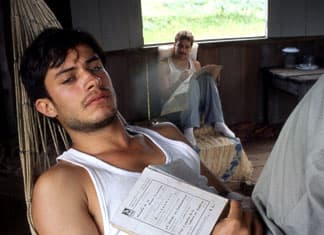Ernesto "Che" Guevara, at the peak of the Cuban Revolution that he led, was quoted as saying that he "was not a movie star" and did not want to be regarded as one. Thirty-five years after his death, it would be interesting to see how Guevara would react to the filmic adaptation of his memoirs.
Set in 1952, The Motorcycle Diaries is not about the Cuban revolution. In fact, Guevara's involvement in it is barely even mentioned. Directed by Academy Award-winning Brazilian director Walter Salles (Central Station), Diaries recounts the true events of Guevara's college years, when he and his friend Alberto (a wonderful Rodrigo de la Serna) decide to travel across South America on their motorcycle.
Their journey begins simply and the film plays like a historic buddy comedy. Ernesto and Alberto are just looking for fun and excitement, and it's very fun and exciting to watch. But as their journey progresses, the themes become more serious and each man grows considerably. Throughout the course of their six-month journey, you begin to really respect and admire their aspirations, specifically Guevara's, who becomes very distraught at witnessing the various injustices to humanity that he comes across in his journey.
With The Motorcycle Diaries, Salles creates a near-poetic blend of comedy, melancholy and history, and although the film is very entertaining, it also feels authentic and educational this might not make Guevara a movie star but he is certainly being played by someone who deserves to be one. Gael Garcia Bernal (Y Tu Mama Tambien, Bad Education) puts everything he has into his performance as the young Guevara. It is almost hypnotic to watch his presence on screen, as he truly embodies his character.
While there are many reasons why The Motorcycle Diaries is a wonderful film, it owes much of its success to the performances of both Bernal and de la Serna. The film describes itself as being about "two lives running parallel for a while." By the film's end, the audience begins to feel that their life ran parallel with these two wonderful characters for a few hours as well. (Alliance Atlantis)
Set in 1952, The Motorcycle Diaries is not about the Cuban revolution. In fact, Guevara's involvement in it is barely even mentioned. Directed by Academy Award-winning Brazilian director Walter Salles (Central Station), Diaries recounts the true events of Guevara's college years, when he and his friend Alberto (a wonderful Rodrigo de la Serna) decide to travel across South America on their motorcycle.
Their journey begins simply and the film plays like a historic buddy comedy. Ernesto and Alberto are just looking for fun and excitement, and it's very fun and exciting to watch. But as their journey progresses, the themes become more serious and each man grows considerably. Throughout the course of their six-month journey, you begin to really respect and admire their aspirations, specifically Guevara's, who becomes very distraught at witnessing the various injustices to humanity that he comes across in his journey.
With The Motorcycle Diaries, Salles creates a near-poetic blend of comedy, melancholy and history, and although the film is very entertaining, it also feels authentic and educational this might not make Guevara a movie star but he is certainly being played by someone who deserves to be one. Gael Garcia Bernal (Y Tu Mama Tambien, Bad Education) puts everything he has into his performance as the young Guevara. It is almost hypnotic to watch his presence on screen, as he truly embodies his character.
While there are many reasons why The Motorcycle Diaries is a wonderful film, it owes much of its success to the performances of both Bernal and de la Serna. The film describes itself as being about "two lives running parallel for a while." By the film's end, the audience begins to feel that their life ran parallel with these two wonderful characters for a few hours as well. (Alliance Atlantis)
